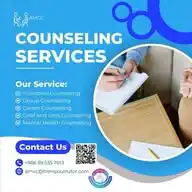
AMCC -An E-Counseling Center
May 22, 2025 at 05:22 PM
*When the Heart Holds Silent Pain: Unspoken Wounds from the Past*
بِسْمِ اللهِ الرَّحْمٰنِ الرَّحِيْمِ
There are wounds we carry that no one sees—memories we never found the words to express. They live in the corners of our hearts, silently shaping how we feel, how we love, and how we show up in the world.
Recently in a counseling session, a sister courageously opened up about painful experiences from childhood—family conflict, grief from losing loved ones, and even unspoken violations of trust that happened at a young age. For years, she kept these memories buried, unsure whether they even mattered anymore. But as life moved on, those buried emotions began to resurface—through anxiety, emotional numbness, and difficulty forming safe connections.
Unresolved trauma doesn’t just disappear.
It waits. And when life gets overwhelming—like a sudden move, a job change, or isolation in a new place—those old feelings return, asking to be seen, heard, and healed.
So what does Islam say about emotional healing?
Allah reminds us in the Qur’an:
“Indeed, with hardship comes ease.” (Surah Ash-Sharh 94:6)
Healing is not just about forgetting—it’s about honoring your pain with the intention to move forward. It’s about seeking help while trusting Allah as Ash-Shāfī (The Healer).
Here’s what we learn from this sister’s journey:
1. Silence doesn’t equal strength.
Hiding your pain doesn’t make you stronger. It delays the healing you deserve. Speaking to a therapist isn’t a sign of weakness—it’s an act of courage.
2. You can love your family and still name the pain.
Islam doesn’t ask you to ignore trauma for the sake of family honor. Speaking about what hurt you, especially in a private and professional setting, is not backbiting—it’s healing.
3. Grief has no expiration date.
Losing a loved one—whether through death, separation, or betrayal—leaves emotional traces. You are allowed to grieve, to ask for help, and to seek comfort through both du’a and therapy.
4. Boundaries are a form of mercy.
Islam teaches us to be compassionate—but not at the cost of our own mental and emotional well-being. Saying “no” with kindness is part of self-care.
To those who are silently struggling—know that Allah sees you. He knows the burden you carry and how long you’ve carried it. Healing begins when you trust that you are worthy of support. It begins when you say, “I need help,” and take that brave first step.
https://whatsapp.com/channel/0029VaGebei8KMqqhswbkK1L/334
There is no shame in your story—only strength in your seeking.
If you or someone you love is carrying silent pain, consider speaking to a trusted, faith-sensitive therapist. You don’t have to carry it alone anymore.
“And He found you lost and guided you.” (Surah Ad-Duhaa 93:7)
❤️
1